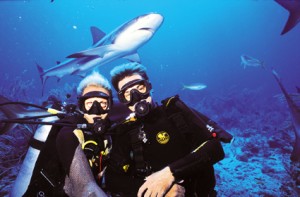Sharks? Is all in your body language…
Posted by Scuba Herald at 9:34 pm 0 Comment Print
 So it seems like with dogs, Sharks bite and eat (you) depending of your body language based on Mike Rutzen a top diver (and a pretty brave guy) that dives with great white sharks without a cage. How cool is that? While he isn’t the first to do it, he’s taken shark diving to a previously unimagined level. He does it not for fun, to win bets or for the adrenaline rush, but to prove a point. And the point is that great white sharks have a gentle side to their nature.It’s largely to campaign for the removal of the nets that that Rutzen wants to change the image of sharks.
So it seems like with dogs, Sharks bite and eat (you) depending of your body language based on Mike Rutzen a top diver (and a pretty brave guy) that dives with great white sharks without a cage. How cool is that? While he isn’t the first to do it, he’s taken shark diving to a previously unimagined level. He does it not for fun, to win bets or for the adrenaline rush, but to prove a point. And the point is that great white sharks have a gentle side to their nature.It’s largely to campaign for the removal of the nets that that Rutzen wants to change the image of sharks.
“They’re decimating the shark population,” he says. “The Sharks Board’s initial purpose was protection by eradication, and they haven’t changed. It was understandable in the 1960s; no-one knew better. But now they should take them down.
But he’s not an airhead hippy claiming sharks are harmless. He is fully aware that sharks in general — and great whites in particular — are fearsome predators. But, he insists, they don’t target humans. If they did, a person would be taken out at least once a day.
“When we get in the water, we’re the dumbest, slowest form of protein,” he says. But we don’t taste good. White sharks are extremely selective in their diet.”
They’re not mindless killers, he insists, and he sets out to prove this by hypnotising them.
All about body language
Rutzen slowly developed the idea of hypnosis while working on shark cage diving boats off the small coastal town of Gansbaai near Cape Town, where he now runs a cage diving operation. There he got to see sharks from the safety of the boat and, occasionally, from the cage.
“The body language thing started when I was safety diver for a cameraman,” he explains. “I started observing what the animal would do. Someone would do something and the animal would react to it. You start picking these things up as you go along.”
Rutzen’s ideas about communicating with sharks through body language are similar to the principles of horse whispering — the technique used to communicate with horses. But horses are domesticated animals and herbivores, while sharks are wild carnivores.
Some people think he’s crazy, and certainly it takes a great deal of courage to slide into the water with these large predators, but Rutzen approaches each dive calmly and philosophically.
“I take small calculated risks to try to gain knowledge to learn about the sharks for conservation reasons. If you try to be Rambo in this game you will be dead. They’re not mindless man-killing machines, but they do have a shorter fuse than anything else I’ve dived with. They are the apex predator and nothing stuffs them around.”
When he enters the water, he curls up, cross-legged and hugging himself, making himself small so the sharks will not feel threatened. Then he reacts to their body language. If a shark approaches in an aggressive way he will stretch out, lifting his hands above his head and making hostile moves towards the shark to chase it away.
“These animals speak to one another in body language. If you can read that language you’re halfway there. The animal can read what your intentions are. It reacts in a way as if it understands your intentions. It’s a very basic communication method. So far it works for me.”
Alternatively, if the shark is calm and curious, he will reach out to it.
“When I first reached out and touched a great white shark and it reacted to me in a positive manner I was stunned, I couldn’t believe it. The moment I touched the animal in a placid manner the animal started treating me in a placid manner. That was a life-changing insight for me. When I touched it without aggression, it reacted to me without aggression.”







